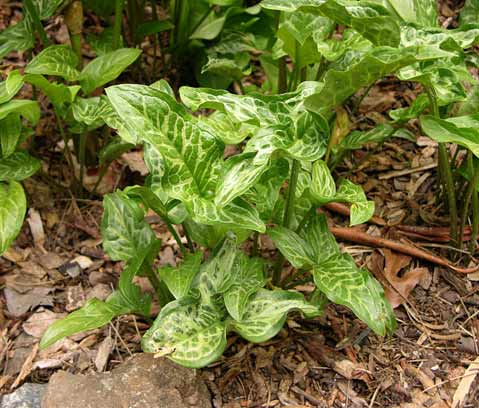Italian Arum
A Delightful Import from the Mediterranean Region

“In favorable conditions will naturalize by volunteer seedlings.” This is a quote from the Sunset Western Garden Book, and it occurs in the description of Italian arum (Arum italicum). This delightful import from southern and western Europe is responding to the abundant and well-spaced rains of this year. Its deep green leaves (sometimes with lovely white veins) are popping up in every corner just now. It’s easy to overlook this plant most of the rest of the year. It is deciduous during the dry months and new seedlings only appear in winter or early spring.
Like many Mediterranean-zone plants, this species persists during that dry season as a dormant tuber, buried out of sight and out of mind. The sudden appearance of the crinkly leaved shoots is usually cause for delight. The fairly inconspicuous flower stalks (not nearly as showy as some of its other relatives like calla lilies) become quite flamboyant once the seeds begin to form. The short stalk is closely packed with fleshy, small bright red fruits. It is these seeds that migrate away from the mother plant to colonize new territory.
In most gardens, the brief appearance, usually over in a month or so, is easily tolerated. In other words, this species can be described with that felicitous term “naturalized.”
Because of its ability to naturalize, however, it may or may not always be a welcome occurrence, and there are plenty of other plants that have migrated far out of their native habitats that are much less welcome. Would anyone use the same term with the truly invasive pampas grass (Cortaderia selloana) that has spread up most of the California coast from its first introduction here in Santa Barbara? Or how about the giant reed Arundo donax, choking waterways everywhere in Southern California? Not a chance. These sinister plant introductions are crowding out native plant populations and are to be viewed with alarm and rigorously eradicated. These are just a few of the bad guys, but there are also enough of the innocent ones like Italian arum. These were accidental introductions, but it is important to guard against new ones, both accidental or through misguided attempts to add diversity to the gardening industry. It’s everyone’s responsibility



